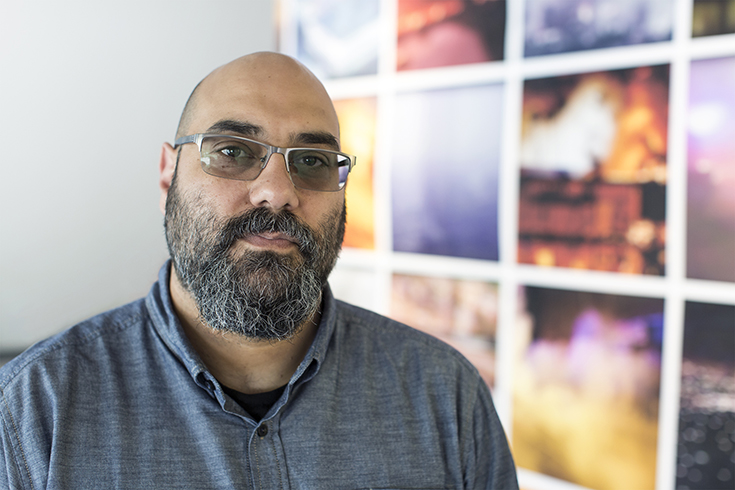An Anti-Racist Institution
 "I also don’t know of another college that is committed to becoming an anti-racist institution," says Matthew Shenoda, Dean of Academic Diversity, Equity, and Inclusion. Photo: Phil Dembinski '08
"I also don’t know of another college that is committed to becoming an anti-racist institution," says Matthew Shenoda, Dean of Academic Diversity, Equity, and Inclusion. Photo: Phil Dembinski '08We’re not simply trying to “make the world a better place.” I want our faculty to take what they learn back to their classrooms and for staff members to include it into the work they do engaging students and colleagues.
This year, Columbia College Chicago is doing something no other higher ed institution is doing: inviting faculty and staff to participate in 15 Undoing Racism workshops. With the support of President Kwang-Wu Kim and Provost Stan Wearden, the Academic Diversity, Equity, and Inclusion (DEI) office has an important, ambitious goal: to make Columbia an anti-racist institution.
Here, Dean of Academic DEI Matthew Shenoda answers some questions on why this is important.
Why are these workshops important now?
Racism is a deep historical issue that has existed since the inception of the United States of America. Sure, we’ve made progress and some people may feel like some of these issues are not at the forefront. But our current climate is shining a light on things that have continued to exist for the last several hundred years. Charlottesville, DACA, Islamophobia, anti-Semitism…these things are rising to the surface for a reason.
These workshops help us see how racism operates in historical and systemic contexts so we can think about how to begin the work of undoing it.
What should attendees expect to take away from these workshops?
There is no quick fix. It’s an intensive two-day experience. It will engage certain ideas or emotions immediately for some, but for others, it might take a little more time—which is good. Time is necessary for these significant, and for some, new concepts to really sink in. Quick, reactionary responses to these things aren’t going to get us anywhere. We need steadier, longer-term approaches.
The most positive effect of these workshops is that they help people recognize the systems in place, implicate themselves in those systems, and possibly shift their positions.
What do you say to people who might resist these workshops?
We’re attempting to create a communal space to engage difficult issues. Typically, people want to avoid uncomfortable conversations. Especially in liberal spaces, people resist talking in a straightforward, direct manner about these issues because it’s uncomfortable or messy or difficult. If we’re committed to a truly globally inclusive space, I argue that it’s beneficial to have these conversations together. As educators, we can all learn something here, even if that learning is a reaffirmation of certain things.
Why race? Why are we focusing on undoing racism and not other diversity issues?
Diversity is an incredibly amorphous term. It includes myriad issues such as sexuality, gender, religion, citizenship status, and so forth. We’re making an explicit choice to begin with race—not to exclude other issues, but to build upon them.
- Focusing on race helps focus the conversation.
- Race is the central, historical, systemic, discriminatory factor upon which all other forms of discrimination are built.
- Race and racism continues to be used to marginalize communities across the world, so it affects the global majority of the planet.
Who is participating in these workshops?
For this first year, we committed our resources toward offering the workshops to as many people as possible. The workshops are available to all full-time faculty, full-time staff, and to as many part-time faculty as the workshops allow. We are currently not offering the workshops to students or part-time staff. The only exception to this is that we are reserving two slots for two student representatives who currently serve on the DEI committee.
Beyond the Undoing Racism worskshops, the entire campus community is encouraged to continue to build on this work through various programming (events, lectures, readings, etc.) throughout the year.
What makes Columbia’s approach unique?
There isn’t another college or institution that I can think of taking on this kind of work with this specific depth and scope. I also don’t know of another college that is committed to becoming an anti-racist institution. We’re not there yet, but we’ve set up the framework to become a truly anti-racist institution if we collectively engage these issues and tie them back to our curriculum and all that we do.
We’re not simply trying to “make the world a better place.” I want our faculty to take what they learn back to their classrooms and for staff members who interface with students to include it into the work they do engaging students and colleagues.
We have the potential to lead the way in higher education around this issue if we take this seriously. We are poised to take a bold step forward.
Additional information
- The Peoples Institute for Survival and Beyond provides a detailed list of what to expect during the Undoing Racism workshops.
- For those eligible for the workshops, check your email for “Undoing Racism Workshops for Faculty and Staff.” If you are eligible and did not receive an invitation please contact Harold Wexler at hwexler@colum.edu.